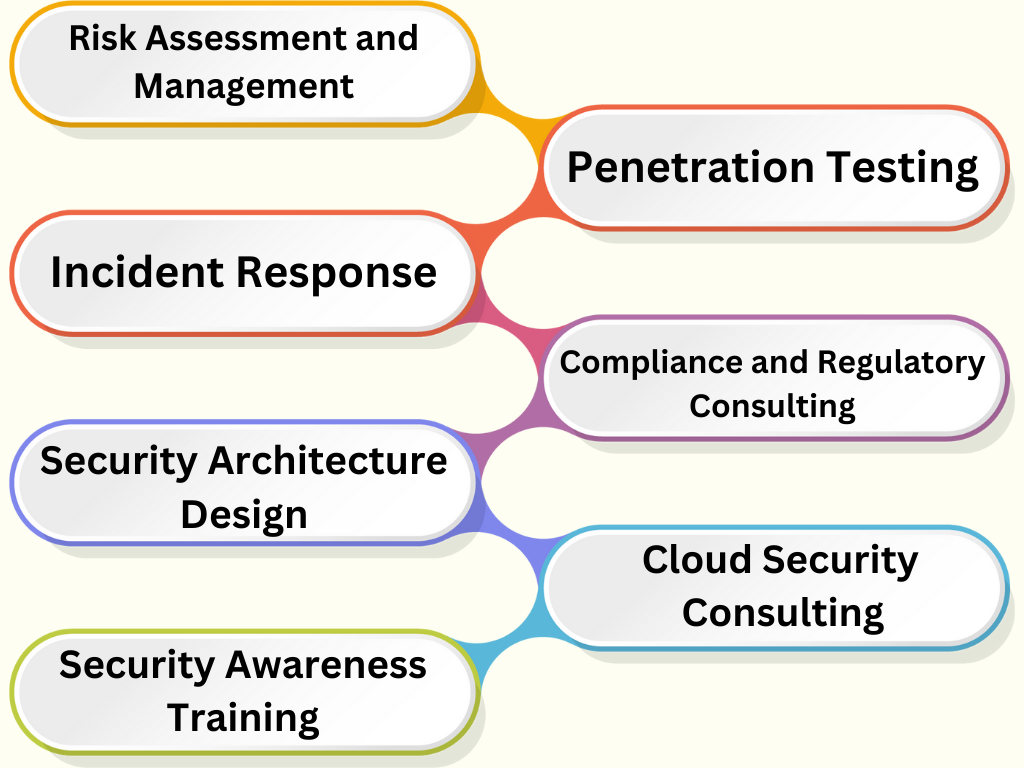Career in Cybersecurity Consulting: Challenges and Opportunities 2025
Table of Contents:
- Introduction to Cybersecurity Consulting
- The Role of a Cybersecurity Consultant
- Skills Required for Cybersecurity Consulting
- Types of Cybersecurity Consulting Services
- Career Pathways in Cybersecurity Consulting
- Challenges Faced by Cybersecurity Consultants
- Opportunities in Cybersecurity Consulting
- Emerging Trends in Cybersecurity Consulting
- Building a Successful Career in Cybersecurity Consulting
- Case Studies: Real-World Cybersecurity Consulting Projects
- Conclusion
Introduction to Cybersecurity Consulting
It is a rapidly growing field that plays a critical role in protecting organizations from cyber threats. As businesses increasingly rely on digital platforms, the need for robust cybersecurity measures has never been more vital. They are professionals who provide expert advice and solutions to help organizations secure their digital assets.
The demand is driven by:
- The rising number of cyberattacks
- Increasing regulatory requirements
- The growing complexity of IT infrastructures

It is a dynamic career that offers a mix of technical challenges, strategic thinking, and business acumen. In this blog, we will explore the challenges and opportunities in this field, along with insights into building a successful career as a cybersecurity consultant.
The Role of a Cybersecurity Consultant
It works with organizations to identify vulnerabilities, assess risks, and implement security measures to protect against cyber threats. Their primary responsibilities include:
Key Responsibilities:
- Conducting security assessments and audits
- Designing and implementing security frameworks
- Providing recommendations for improving security posture
- Assisting with incident response and recovery
- Ensuring compliance with regulatory requirements
Types of Clients:
- Small and Medium Enterprises (SMEs): Often lack in-house cybersecurity expertise
- Large Corporations: Require specialized skills to address complex security challenges
- Government Agencies: Focus on securing critical infrastructure and sensitive data
- Non-Profit Organizations: Need to protect donor information and sensitive data
Skills Required for Cybersecurity Consulting
To succeed, you need a combination of technical expertise, analytical skills, and effective communication. Below are the key skills required:
Technical Skills:
- Proficiency in network security, firewalls, and VPNs
- Knowledge of cryptography and encryption techniques
- Understanding of malware analysis and reverse engineering
- Familiarity with cloud security (AWS, Azure, Google Cloud)
- Experience with security tools such as SIEM, IDS/IPS, and vulnerability scanners
Soft Skills:
- Problem-solving and critical thinking
- Effective communication and presentation skills
- Ability to work under pressure and manage multiple clients
- Business acumen to understand client needs
Certifications:
- Certified Information Systems Security Professional (CISSP)
- Certified Ethical Hacker (CEH)
- Offensive Security Certified Professional (OSCP)
- Certified Information Security Manager (CISM)
- Certified Cloud Security Professional (CCSP)
Types of Cybersecurity Consulting Services
It covers a wide range of services to address different security needs. Some of the most common services include:

1. Risk Assessment and Management:
Identifying and evaluating potential risks to an organization’s information assets.
2. Penetration Testing:
Simulating cyberattacks to identify vulnerabilities in systems and networks.
3. Incident Response:
Assisting organizations in managing and recovering from security breaches.
4. Compliance and Regulatory Consulting:
Ensuring that organizations meet industry standards and regulatory requirements, such as GDPR, HIPAA, and PCI-DSS.
5. Security Architecture Design:
Developing and implementing security frameworks tailored to an organization’s needs.
6. Cloud Security Consulting:
Providing solutions to secure cloud-based environments and services.
7. Security Awareness Training:
Educating employees on best practices to reduce human error in cybersecurity.
Career Pathways
A career in it can take various forms, depending on your interests and expertise. Here are some potential career pathways:
1. Independent Consultant:
Working as a freelancer or starting your own cybersecurity consulting firm.
2. Corporate Consultant:
Joining a consulting firm and working with a variety of clients across different industries.
3. Specialist Consultant:
Focusing on a specific area of cybersecurity, such as cloud security, IoT security, or incident response.
4. Government:
Providing cybersecurity services to government agencies and public sector organizations.
Challenges Faced
Cybersecurity consulting is not without its challenges. Some of the most common challenges include:
1. Keeping Up with Evolving Threats:
Cyber threats are constantly changing, making it essential for them to stay updated with the latest trends and technologies.
2. Managing Client Expectations:
Clients may have unrealistic expectations about what cybersecurity measures can achieve.
3. Balancing Technical and Business Aspects:
It need to translate complex technical information into actionable business insights.
4. Regulatory Compliance:
Ensuring that clients comply with various regulations can be challenging, especially for global organizations.
Opportunities in Cybersecurity Consulting
Despite the challenges, It offers numerous opportunities for growth and advancement. Some of the key opportunities include:
1. High Demand:
The increasing number of cyberattacks has created a high demand for them.
2. Lucrative Salaries:
It often command high salaries, especially those with specialized skills.
3. Diverse Industries:
It can work in various industries, including finance, healthcare, retail, and government.
4. Continuous Learning:
The field offers opportunities for continuous learning and skill development.
Emerging Trends in Cybersecurity Consulting
The cybersecurity landscape is constantly evolving. Here are some emerging trends:
1. Zero Trust Architecture:
Implementing a zero-trust security model to reduce the risk of breaches.
2. Artificial Intelligence and Machine Learning:
Using AI and ML to detect and respond to threats more effectively.
3. IoT Security:
Securing Internet of Things (IoT) devices, which are increasingly being targeted by attackers.
4. Cloud Security:
Providing solutions to secure cloud environments, which are becoming the norm for many organizations.
5. Privacy and Data Protection:
Helping organizations comply with data privacy regulations and protect sensitive information.
Building a Successful Career in Cybersecurity Consulting
To build a successful career, consider the following tips:
1. Gain Relevant Experience:
Work on real-world projects to gain practical experience.
2. Obtain Certifications:
Certifications can help you stand out in a competitive job market.
3. Network with Professionals:
Attend industry events and join cybersecurity communities to build your network.
4. Stay Updated:
Keep up with the latest cybersecurity trends and technologies.
Case Studies: Real-World Cybersecurity Consulting Projects
Case Study 1: Securing a Financial Institution
Description of the project, challenges faced, solutions provided, and outcomes.
Case Study 2: Responding to a Ransomware Attack
Details about the incident response process, recovery steps, and lessons learned.
Conclusion
A career in it offers a rewarding mix of challenges and opportunities. As businesses continue to face evolving cyber threats, the demand for skilled cybersecurity consultants will only increase. By acquiring the right skills, gaining practical experience, and staying updated with the latest trends, you can build a successful career in this dynamic field.






